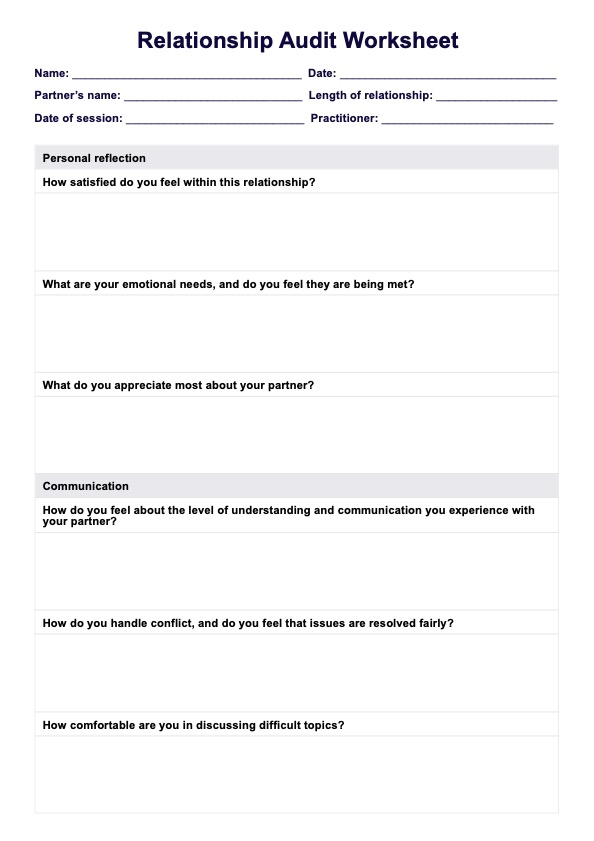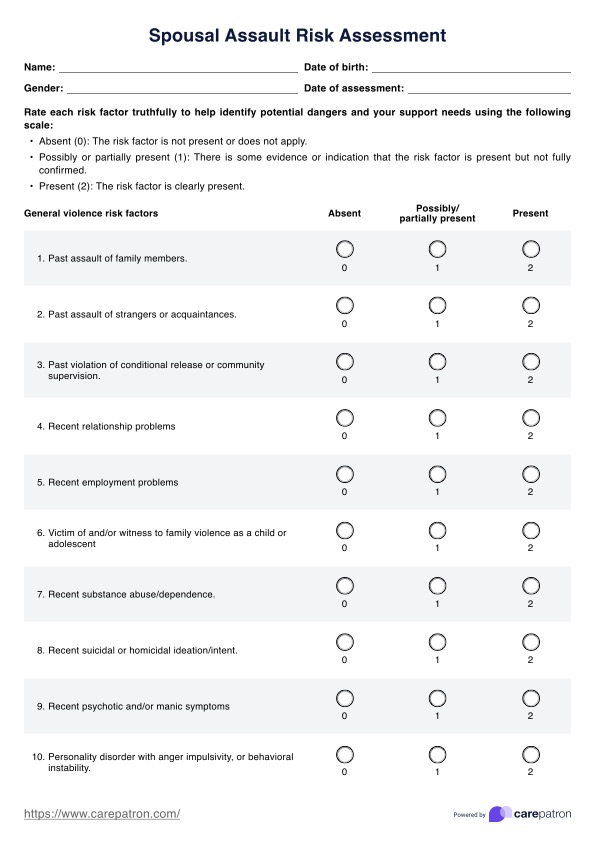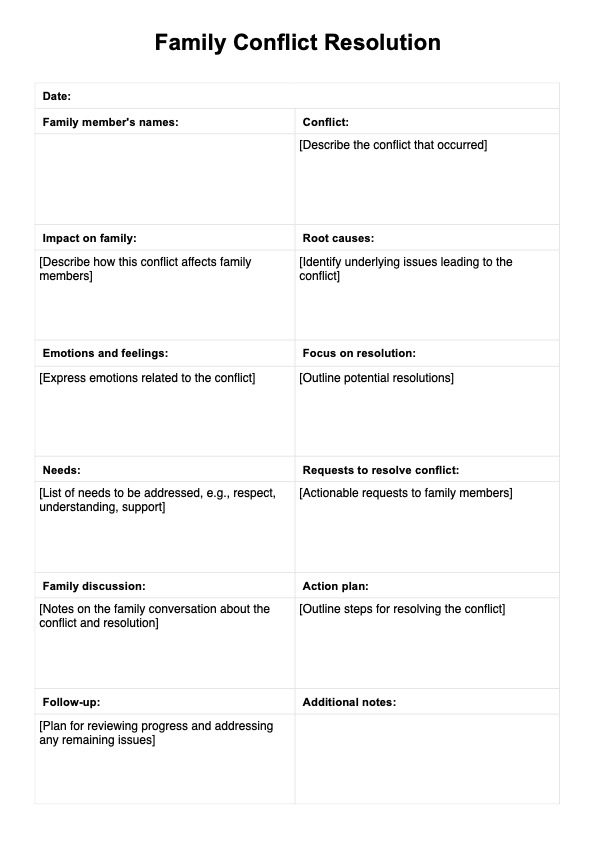Stages of Healing After Narcissistic Abuse
Explore the stages of healing from narcissistic abuse and gain insights on recovery with this comprehensive guide.


What is narcissistic abuse?
Narcissistic abuse refers to a specific type of emotional and psychological abuse perpetrated by individuals displaying characteristics of narcissistic personality disorder (NPD) or those with pronounced narcissistic traits. This form of abuse is marked by a pattern of manipulative and harmful, abusive behaviors aimed at asserting control and superiority over the victim.
Overview of narcissistic abuse
Narcissistic abuse often involves tactics such as gaslighting, where the abuser manipulates the victim into doubting their own memory or sanity, constant criticism, and emotional blackmail. These actions can severely impact the mental and physical health of the victim, leading to anxiety, depression, and a diminished sense of self-worth.
Common signs and symptoms
Survivors of narcissistic abuse may exhibit a range of signs of narcissistic injury, including:
- Persistent manipulation and deceit, leading to constant self-doubt and confusion.
- Emotional withdrawal or a sense of isolation from friends and family.
- Symptoms of trauma such as hypervigilance and flashbacks.
- A noticeable decrease in self-esteem.
- Difficulty making decisions or asserting themselves.
Importance of understanding narcissistic abuse
For healthcare professionals, recognizing the signs of narcissistic abuse is crucial for effective diagnosis and intervention. Understanding this type of abuse can aid in developing targeted therapeutic strategies that address the complex emotional and psychological damage inflicted on victims. This awareness is also vital for supporting victims in their recovery process, helping them rebuild their self-esteem and self-confidence, reestablish healthy boundaries, and regain autonomy over their lives.
Stages of Healing After Narcissistic Abuse Template
Stages of Healing After Narcissistic Abuse Example
Stages of Healing After Narcissistic Abuse
The healing process can be complex and multifaceted, typically unfolding across several stages. This structured approach to recovery helps survivors understand and manage their journey towards healing. Here's a breakdown of the ten stages:
Stage 1: Denial
Survivors often begin their recovery from an abusive relationship with a vague sense that something is wrong in the relationship without immediately recognizing it as abuse. This stage is characterized by denial and making excuses for the behavior of the narcissistic partner.
Stage 2: Shock and confusion
As the abuse escalates, survivors start to see the reality of their situation, which may lead to shock, confusion, and cognitive dissonance. This is a critical period where the struggle between acknowledging the abuse and wanting to maintain the status quo takes place.
Stage 3: Stage identification
This stage involves acknowledging the abuse and identifying the narcissistic abuser's narcissistic traits. It often comes after survivors educate themselves about narcissism and its effects.
Stage 4: Separation
The realization that the narcissist is unlikely to change drives survivors to initiate a separation. This may start as a temporary break but often leads to a permanent distancing.
Stage 5: Complicated grief
Following separation, survivors of abusive relationships often experience complex trauma symptoms, including grief and anger. This complicated grief can be challenging and may feel like a rollercoaster of emotions.
Stage 6: Education
Education is a powerful tool for survivors, helping them to make sense of their experiences and connect with others who have faced similar situations. This stage is often where significant healing begins as understanding grows.
Stage 7: Recovery
Survivors learn to focus on self-care and healing, reconnecting with their needs and desires. This stage involves developing new coping strategies and rebuilding one's sense of low self-esteem.
Stage 8: Restoration
In this stage, survivors work on re-establishing their independence and reconstructing their lives according to their terms, including new relationships, career paths, or interests.
Stage 9: Meaning-making
Survivors begin to reflect on their experiences and find meaning, which can catalyze personal growth and lead to healthy relationships and a deeper understanding of themselves and their relationships.
Stage 10: Paying it forward
The final stage involves using the survivor's experiences to help others. Whether through advocacy, support groups, or personal interactions, this stage focuses on transforming personal suffering into a source of strength for the survivor and others.
How to use our narcissistic abuse recovery template?
As a mental health professional, you play an important role in your client's healing journey. Our narcissistic abuse recovery template is designed to help practitioners have a resource to guide clients through each stage of their healing journey after experiencing narcissistic abuse.
To effectively use this template, familiarize yourself with each stage to educate your client and explore where they currently are in their journey.
Encourage them to engage actively with the recommended activities and resources for each stage. Suggest ways for them to reflect on their boundaries and experiences in each phase. They can also consider documenting their thoughts and feelings in a journal.
Remind them that recovery is not linear and may require revisiting certain stages as they gain new insights or face different challenges. This template can provide structure and clarity, but it's important always to prioritize personal adaptation to fit your client's needs.
Benefits of using this template
This template serves as a valuable resource for healthcare practitioners working with individuals who have experienced narcissistic abuse. By understanding the stages of healing, practitioners can provide more targeted and effective support to their clients. The template offers several key benefits:
- Knowledge and awareness: The template provides a comprehensive overview of the stages of healing, enabling practitioners to better understand the challenges and emotions their clients may be experiencing. This knowledge allows for more informed and empathetic care.
- Normalization and validation: The template helps normalize the healing process by outlining common experiences and emotions associated with each stage. This can be incredibly validating for clients, helping them feel understood and less alone in their journey.
- Tailored interventions: Understanding the specific needs and challenges of each stage allows practitioners to tailor their interventions and support strategies accordingly. This targeted approach can enhance the effectiveness of treatment and promote healing.
- Client empowerment: The template can be used as a psychoeducational tool to help clients understand their own healing process. This knowledge can empower clients to actively participate in their recovery and develop coping strategies specific to their current stage.
Commonly asked questions
Yes, there are many support groups available for individuals recovering from narcissistic abuse, both online and in person, offering a community of peers who understand and share similar experiences.
Survivors of narcissistic abuse can get help by seeking therapy from professionals experienced in dealing with narcissistic abuse, joining support groups, and educating themselves about narcissism to understand their experiences better.
Finding oneself again after a narcissistic relationship involves engaging in self-care practices, reconnecting with your interests and passions, and possibly seeking the guidance of a therapist who specializes in recovery from emotional abuse.


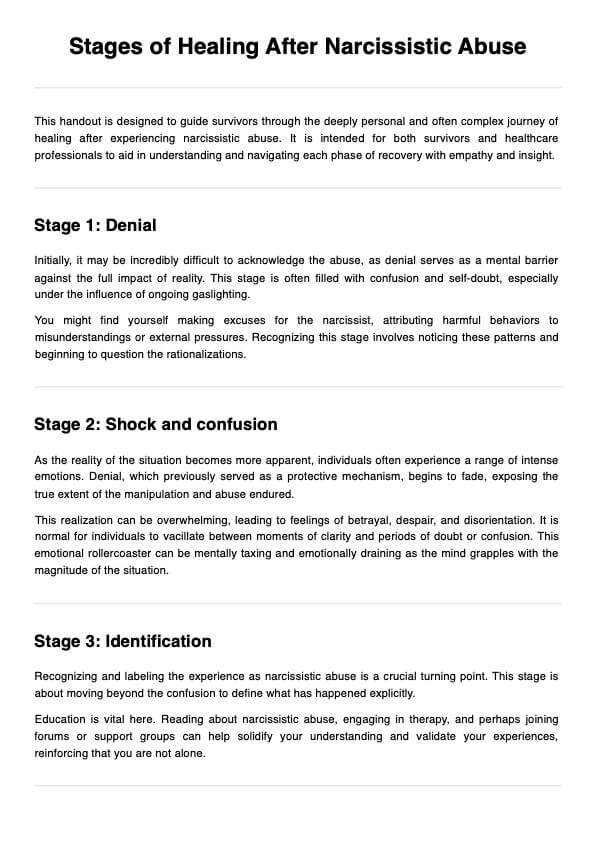
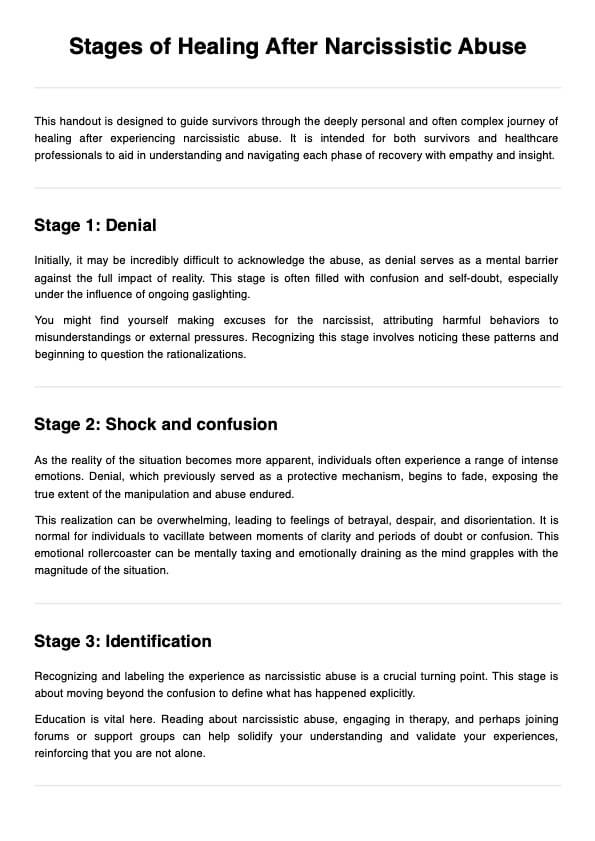
















-template.jpg)


